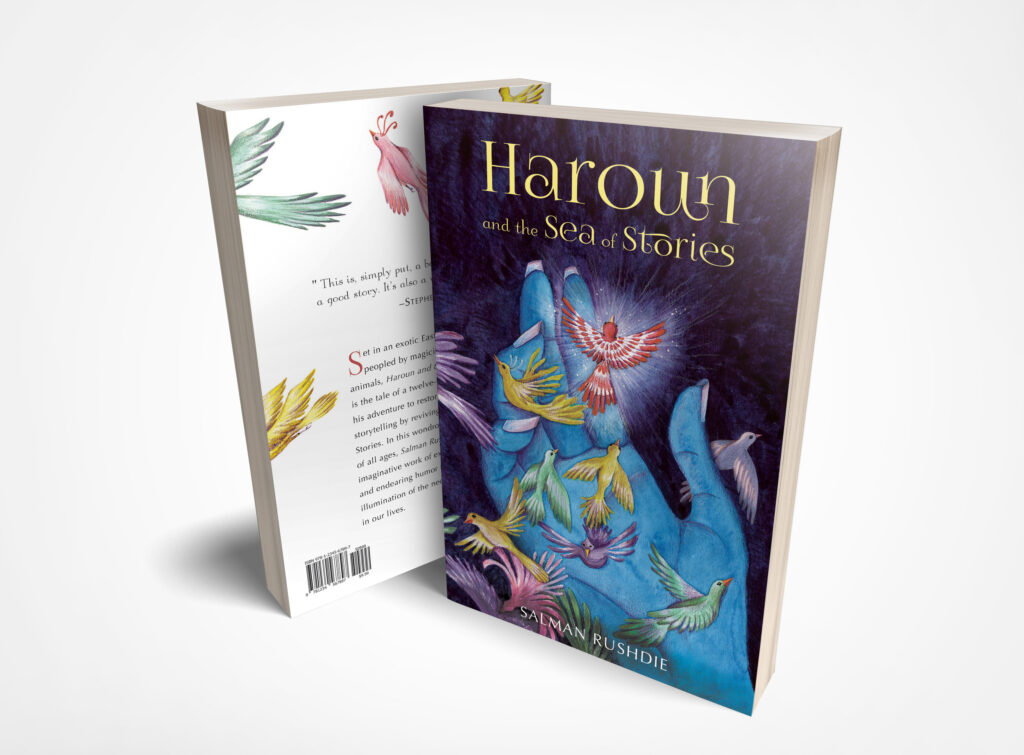"Through 'Haroun and the Sea of Stories,' Salman Rushdie mirrors his path from Bombay to literary prominence, embracing adversity with the captivating allure of storytelling."

Salman Rushdie, a British-Indian author born on June 19, 1947, in Bombay (now Mumbai), India, has established himself as a prominent figure in contemporary literature. Known for his mastery in blending magical realism with political and historical narratives, Rushdie gained international acclaim with his critically acclaimed and controversial novel, “The Satanic Verses.”
Rushdie’s early life was marked by a multicultural upbringing, reflecting the diversity of his heritage. He pursued higher education in England, attending King’s College, University of Cambridge, where he studied history. His literary career began with the publication of his first novel, “Grimus,” in 1975, but it was the release of “Midnight’s Children” in 1981 that catapulted him to literary stardom. The novel, exploring the history of post-colonial India through the lives of its protagonists, won the Booker Prize and the Booker of Bookers, further solidifying Rushdie’s reputation as a literary force.
However, Rushdie’s life took a dramatic turn with the publication of “The Satanic Verses” in 1988. The novel, which explored themes of religion and identity, ignited widespread controversy and led to a fatwa (religious decree) issued against Rushdie by Iran’s Ayatollah Ruhollah Khomeini. The fatwa, calling for Rushdie’s assassination, forced him into hiding for several years, during which he continued to write and advocate for freedom of expression.
Amidst the challenges and threats he faced, Salman Rushdie authored “Haroun and the Sea of Stories,” a departure from his previous works in terms of genre and tone. Published in 1990, the novel is a fantastical tale that intertwines elements of myth, fable, and allegory. “Haroun and the Sea of Stories” is a story within a story, unfolding in a magical land where storytelling is integral to maintaining harmony and balance. The protagonist, Haroun, embarks on a quest to restore the Sea of Stories after it is polluted by dark forces.
The reasons behind Rushdie’s creation of “Haroun and the Sea of Stories” are multi-faceted. The novel, written during a tumultuous period in the author’s life, served as a creative sanctuary and a means of expressing resilience in the face of adversity. It allowed Rushdie to delve into the enchanting realm of storytelling, offering a cathartic escape from the harsh realities he confronted. Furthermore, the narrative in “Haroun and the Sea of Stories” can be interpreted as a celebration of the power of storytelling, emphasising its role in preserving cultural identity, combating censorship, and fostering imagination.
In crafting “Haroun and the Sea of Stories,” Salman Rushdie demonstrated not only his versatility as a storyteller but also his ability to navigate complex themes with grace and humour. The novel stands as a testament to his unwavering commitment to the transformative and redemptive power of literature, even in the face of profound personal and political challenges.

Leave a Reply